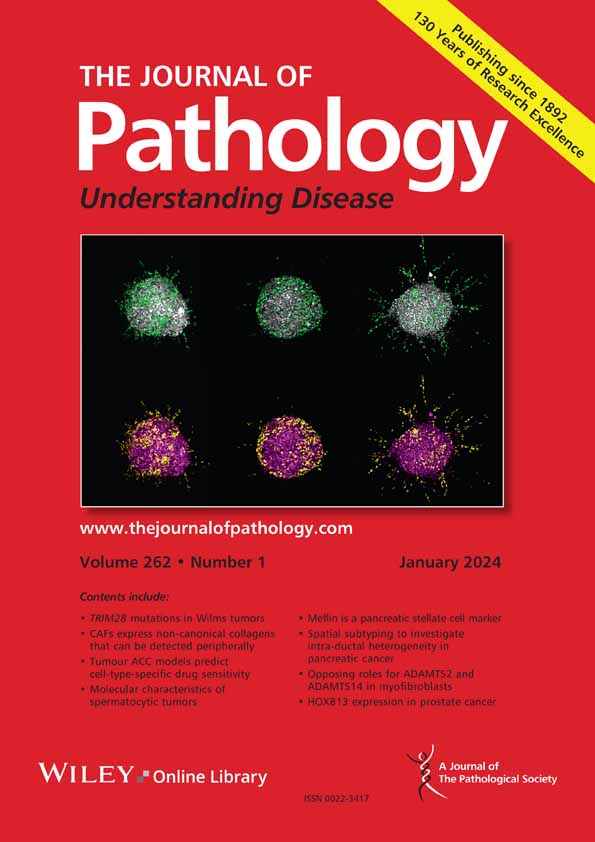求助PDF
{"title":"BIRC3 deficiency blocks the ubiquitination and degradation of GOT2 to impede antitumor immune responses in lung squamous cell carcinoma","authors":"Qiang Zhang, Hongxu Sheng, Dongnan Ping, Jixiang Gao","doi":"10.1002/path.6448","DOIUrl":null,"url":null,"abstract":"<p>In lung squamous cell carcinoma (LUSC), the proportion of exhausted CD8<sup>+</sup> T cells is considerably higher than in lung adenocarcinoma (LUAD). The exhaustion of CD8<sup>+</sup> T cells is responsible for the failure of immunotherapies, as terminally exhausted CD8<sup>+</sup> T cells do not respond to immune checkpoint blockade. Therefore, investigating the regulatory mechanisms underlying CD8<sup>+</sup> T-cell exhaustion in LUSC is essential for potentiating the efficacy of immunotherapy in this context. In our study, cellular assays revealed that elevated expression of <i>GOT2</i> in LUSC reinforced the exhaustion of cocultured CD8<sup>+</sup> T cells, as evidenced by elevated levels of TIGIT and TIM-3, while simultaneously impairing tumor-killing capabilities, as indicated by reduced LDH activity and diminished apoptosis. Animal experiments confirmed that knockdown of <i>GOT2</i> effectively curbed tumor growth and boosted the CD8<sup>+</sup> T cell infiltration and tumor-killing function. Mechanistic studies demonstrated that BIRC3, acting as an E3 ubiquitin ligase, can recognize the 366–372 sequence of GOT2, mediating its ubiquitination and degradation. The deficiency of <i>BIRC3</i> in LUSC interrupted ubiquitination and subsequent degradation of GOT2, leading to elevated GOT2 protein levels, which in turn facilitated CD8<sup>+</sup> T-cell exhaustion and ultimately compromised their antitumor immune responses. Collectively, our findings elucidated the regulatory role of protein ubiquitination in CD8<sup>+</sup> T cell functionality, highlighting a novel approach to enhance the sensitivity of LUSC to immunotherapy through the intervention of the BIRC3/GOT2 ubiquitination axis. © 2025 The Pathological Society of Great Britain and Ireland.</p>","PeriodicalId":232,"journal":{"name":"The Journal of Pathology","volume":"267 2","pages":"142-154"},"PeriodicalIF":5.2000,"publicationDate":"2025-07-21","publicationTypes":"Journal Article","fieldsOfStudy":null,"isOpenAccess":false,"openAccessPdf":"","citationCount":"0","resultStr":null,"platform":"Semanticscholar","paperid":null,"PeriodicalName":"The Journal of Pathology","FirstCategoryId":"3","ListUrlMain":"https://pathsocjournals.onlinelibrary.wiley.com/doi/10.1002/path.6448","RegionNum":2,"RegionCategory":"医学","ArticlePicture":[],"TitleCN":null,"AbstractTextCN":null,"PMCID":null,"EPubDate":"","PubModel":"","JCR":"Q1","JCRName":"ONCOLOGY","Score":null,"Total":0}
引用次数: 0
引用
批量引用
Abstract
In lung squamous cell carcinoma (LUSC), the proportion of exhausted CD8+ T cells is considerably higher than in lung adenocarcinoma (LUAD). The exhaustion of CD8+ T cells is responsible for the failure of immunotherapies, as terminally exhausted CD8+ T cells do not respond to immune checkpoint blockade. Therefore, investigating the regulatory mechanisms underlying CD8+ T-cell exhaustion in LUSC is essential for potentiating the efficacy of immunotherapy in this context. In our study, cellular assays revealed that elevated expression of GOT2 in LUSC reinforced the exhaustion of cocultured CD8+ T cells, as evidenced by elevated levels of TIGIT and TIM-3, while simultaneously impairing tumor-killing capabilities, as indicated by reduced LDH activity and diminished apoptosis. Animal experiments confirmed that knockdown of GOT2 effectively curbed tumor growth and boosted the CD8+ T cell infiltration and tumor-killing function. Mechanistic studies demonstrated that BIRC3, acting as an E3 ubiquitin ligase, can recognize the 366–372 sequence of GOT2, mediating its ubiquitination and degradation. The deficiency of BIRC3 in LUSC interrupted ubiquitination and subsequent degradation of GOT2, leading to elevated GOT2 protein levels, which in turn facilitated CD8+ T-cell exhaustion and ultimately compromised their antitumor immune responses. Collectively, our findings elucidated the regulatory role of protein ubiquitination in CD8+ T cell functionality, highlighting a novel approach to enhance the sensitivity of LUSC to immunotherapy through the intervention of the BIRC3/GOT2 ubiquitination axis. © 2025 The Pathological Society of Great Britain and Ireland.
BIRC3缺乏阻断GOT2的泛素化和降解,阻碍肺鳞状细胞癌的抗肿瘤免疫反应。
在肺鳞癌(LUSC)中,耗竭CD8+ T细胞的比例明显高于肺腺癌(LUAD)。CD8+ T细胞的耗尽是免疫治疗失败的原因,因为最终耗尽的CD8+ T细胞对免疫检查点封锁没有反应。因此,在这种情况下,研究LUSC中CD8+ t细胞耗竭的调节机制对于增强免疫治疗的疗效至关重要。在我们的研究中,细胞分析显示,LUSC中GOT2表达的升高增强了共培养CD8+ T细胞的衰竭,这可以通过TIGIT和TIM-3水平的升高来证明,同时LDH活性降低和细胞凋亡减少也可以证明,GOT2表达的升高会损害肿瘤杀伤能力。动物实验证实,敲低GOT2可有效抑制肿瘤生长,增强CD8+ T细胞浸润和肿瘤杀伤功能。机制研究表明BIRC3作为E3泛素连接酶,可以识别GOT2的366-372序列,介导其泛素化和降解。LUSC中BIRC3的缺乏中断了泛素化和随后的GOT2降解,导致GOT2蛋白水平升高,进而促进CD8+ t细胞衰竭,最终损害其抗肿瘤免疫反应。总之,我们的研究结果阐明了蛋白泛素化在CD8+ T细胞功能中的调节作用,强调了通过干预BIRC3/GOT2泛素化轴来增强LUSC对免疫治疗敏感性的新方法。©2025英国和爱尔兰病理学会。
本文章由计算机程序翻译,如有差异,请以英文原文为准。




 求助内容:
求助内容: 应助结果提醒方式:
应助结果提醒方式:


